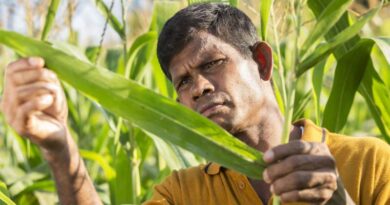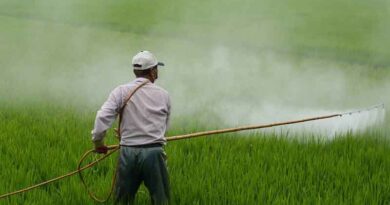Bayer’s contribution to the national food security conversation
04 January 2023, AU: Bayer recently provided a submission to the federal government’s inquiry into food security in Australia. We commend the government for putting this important topic on the national agenda – particularly at a time when Australia is experiencing a myriad of conditions affecting the secure supply of food across the country. Further detail on Bayer’s submission can be found below.
Brad Thompson from the Australian Financial Review recently sat down with Warren Inwood, Managing Director of Bayer’s Crop Science division in Australia and New Zealand, and put together this piece on food security and Warren has provided further insights on the topic below.
Science must be put on the table if we are to look after farmers and families
Australia is no stranger to mother nature’s fury.
In a country where there can be a tropical cyclone on one side and winter-like conditions in November on the other, many cities will experience four seasons in one day. You only have to look at what’s happening on supermarket shelves to see the tangible impact climate change is having on our communities. Food security is explicitly interlinked and cannot be ignored.
With a third consecutive La Nina declared for Australia’s east, we are already experiencing increased rainfall and damaging rains, winds, and floods from the top of Queensland all the way to our nation’s capital.
While Australia is one of the most food-secure nations in the world, this continued out-of-the-ordinary weather system has seen a knock-on effect to food security. On one hand, wild weather causes floods that often cut off regional and remote communities. This impacts their access to food, putting strain on existing food supply chains and often increasing the cost of those items.
And there’s our farmers. The fields that grow our produce are the most vulnerable to unpredictable weather patterns and are often first to be hardest hit. Gone are the days where farmers are desperate to see the skies open. Too much rain is just as bad as not enough, resulting in crops literally being wiped out and under water.
Any economist will tell you that when a food source is scarce, it increases in price – and climate change is accelerating this at an unprecedented rate. Take the humble iceberg lettuce. In mid-2022, the cost of lettuce went from $2.50 to $10 on supermarket shelves. This increase saw the otherwise mundane and staple food item lead national headlines, all due to a large-scale flooding event earlier that year. Not even fast-food chains could afford to absorb the cost and swapped to cabbage – causing a social media frenzy for those who love their burgers.
Despite the outrage at our supermarkets, behind the scenes yet on the frontline of each food scarcity is our farmers. We know they are resilient, but you can only imagine the anguish they feel when they watch a yearly crop wash away.
Then comes the almighty clean-up and a loss of income. A farmer who must re-build and go back to the bank seeking financial support. We all know the about the mental health challenges that come with working on the land.
In an economic landscape where resilience is being tested in every avenue, it’s everyday Australians who are forced to pick up the bill for climate change. In September 2022, the Australian Bureau of Statistics Consumer Price Index reported a 16.2 per cent rise in the cost of fruit and vegetables compared to this time last year – that’s more than any other consumer good.
If you overlay this with inflation, housing prices and day-to-day living, for many families, this festive season may not be merry. The cost-of-living crisis is pushing people from the bread line to queues at local food banks who are struggling to keep up with demand on their services.
The House of Representatives Inquiry into food security is welcome news and an important first step. By putting it on the national agenda, government and industry can come together to help answer the ultimate question – how do we protect our food security?
And what role does science play in this space? Australia has some of the best produce on our shelves anywhere in the world, and this deserves to be protected. Australian farmers also deserve the access and support to the latest innovation and technologies to enable them to produce more with less.
By tapping into scientific agricultural solutions, farmers have access to tailored tools to plant, grow and, importantly, protect their harvests. If we can grow food to withstand new pest and disease threats and use innovative breeding techniques to help crops grow in more diverse climates and weather conditions, this will help ensure a more secure global food supply. Breakthrough gene editing technologies like CRISPR are showing great potential in developing the tools to protect plants against climate change impacts.
We believe both collaboration and swift action at scale are key to mitigating the global food crisis and preventing longer-term food shortages at home and abroad. Strengthening our global food system requires prioritising access to innovation, supporting smallholder farmers, and an active approach to fighting climate change. At Bayer, we’re working on research and development for solutions that meet farmers’ needs with minimal impact on natural resources.
If we can do this as a country, it’s not just farmers who are going to benefit – it’s everyday Aussies who will be guaranteed fresh produce year-round at an affordable price. It’s securing fresh fruits and vegetables, rich in nutrients that nourishes us from the inside out and this should be available to everyone, no matter their postcode or bank balance. That has got to be the ultimate goal.
In the meantime, we’ll continue to push ahead with connecting what we’re doing in our labs to the land.
Warren Inwood, Managing Director, Australia and New Zealand Crop Science division of Bayer
Key recommendations from Bayer’s submission to the federal government’s inquiry into food security in Australia
- Modernise the National Gene Technology Scheme to provide certainty to industry and growers
- Better align phytosanitary seed testing with international standards to allow access to innovation
- Prioritise building manufacturing, engineering, and construction skills to increase onshore manufacturing capacity
- Invest in rural and regional transport infrastructure to increase efficiency and reduce freight costs
- Demonstrate regional and global leadership on science-based regulation, through appropriate international fora, in the following areas:
a. Harmonising gene technology definitions and regulation
b. Adherence to World Trade Organisation rules on non-technical barriers to trade
c. Coordinating efforts with regional partner governments to ensure global sustainability goals are met without limiting regional agricultural productivity and access to innovation. - Prioritise partnering with importers to ensure plant biosecurity systems can respond to climate change-induced biosecurity threats
- Increase investment in regional capacity-building projects, including through public-private partnerships
Also Read: Raw sugar on track for 4th consecutive annual gain
(For Latest Agriculture News & Updates, follow Krishak Jagat on Google News)















